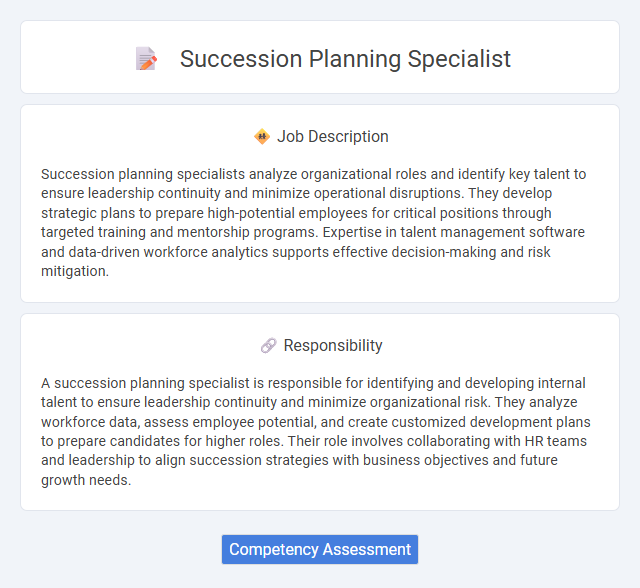
Succession planning specialists analyze organizational roles and identify key talent to ensure leadership continuity and minimize operational disruptions. They develop strategic plans to prepare high-potential employees for critical positions through targeted training and mentorship programs. Expertise in talent management software and data-driven workforce analytics supports effective decision-making and risk mitigation.
Individuals with strong analytical skills and a deep understanding of organizational dynamics are likely to be well-suited for a succession planning specialist role. Those who are comfortable working with data, forecasting talent needs, and developing strategic workforce plans will probably thrive in this position. However, people who struggle with long-term strategic thinking or lack interpersonal skills may find this job challenging.
Qualification
A Succession Planning Specialist must possess a deep understanding of human resources, talent management, and organizational development, often holding a bachelor's degree in business administration, human resources, or a related field. Professional certifications such as SHRM-CP, PHR, or talent management credentials enhance expertise in identifying key leadership roles and developing strategic pipelines. Strong analytical skills, experience with workforce planning software, and the ability to assess employee potential and performance metrics are critical qualifications for success in this role.
Responsibility
A succession planning specialist is responsible for identifying and developing internal talent to ensure leadership continuity and minimize organizational risk. They analyze workforce data, assess employee potential, and create customized development plans to prepare candidates for higher roles. Their role involves collaborating with HR teams and leadership to align succession strategies with business objectives and future growth needs.
Benefit
Succession planning specialists are likely to improve organizational stability by identifying and preparing future leaders, reducing risks associated with sudden vacancies. Their expertise probably enhances employee retention and engagement through clear career development pathways. Companies employing these specialists may experience smoother transitions and sustained business continuity as a result.
Challenge
Succession planning specialists likely face the challenge of accurately identifying high-potential employees to ensure seamless leadership transitions. Balancing organizational goals with individual career development may present complexities, especially in dynamic business environments. Navigating resistance to change and aligning succession strategies with long-term workforce planning could also pose significant difficulties.
Career Advancement
Succession planning specialists enhance organizational stability by identifying and developing future leaders through strategic talent management and competency mapping. They drive career advancement by creating personalized development plans that align employee potential with business goals, ensuring a robust leadership pipeline. Mastery of workforce analytics and leadership assessment tools is crucial for optimizing talent retention and growth opportunities.
Key Terms
Competency Assessment
A Succession Planning Specialist excels in competency assessment by systematically evaluating employees' skills, knowledge, and performance to identify high-potential candidates for leadership roles. This process involves using behavioral metrics, psychometric tests, and performance reviews to map competencies against organizational requirements. Effective competency assessment ensures a robust talent pipeline, minimizes leadership gaps, and aligns workforce capabilities with strategic business goals.
 kuljobs.com
kuljobs.com